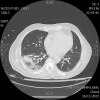Can euglycemic Diabetic Ketoacidosis Caused by SGLT2 Inhibitors be avoided in Covid-19 and other acute Infections?
- PMID: 38455692
- PMCID: PMC10917412
- DOI: 10.12890/2024_004282
Can euglycemic Diabetic Ketoacidosis Caused by SGLT2 Inhibitors be avoided in Covid-19 and other acute Infections?
Abstract
Introduction: We present a case of anion gap euglycemic diabetic ketoacidosis (EuDKA) in a patient with COVID-19 infection. Patients with diabetes mellitus are at increased risk of severe illness, and hyperglycaemia is associated with higher morbidity and mortality in patients infected with COVID-19.
Case description: A 76-year-old male with diabetes mellitus treated with SGLT2 inhibitor tested positive for COVID-19 infection on day 3 after his admission. In the emergency room he had a high anion gap metabolic acidosis and a blood glucose of 248 mg/dl. His urine tested strongly positive for ketones. A diagnosis of euglycemic diabetic ketoacidosis was made and he was treated with intravenous insulin and normal saline; his antidiabetic medications were stopped. His metabolic acidosis gradually resolved, and he was discharged.
Discussion: Euglycemic diabetic ketoacidosis is a rare complication of COVID-19 infection. It is defined by the American Diabetes Association as the triad of anion gap metabolic acidosis with arterial pH <7.3, serum bicarbonate <18 mmol/l and ketonuria or ketonemia. It is a life-threatening complication which usually occurs in type 1 diabetes mellitus patients but may also occur in type 2 diabetes mellitus patients. As described earlier, it is associated with hyperglycaemia but if blood glucose is low or near normal but <250 mg/dl it is then named euglycemic diabetic ketoacidosis. Patients treated with SGLT2 inhibitors are at increased risk of euglycemic diabetic ketoacidosis.
Conclusions: COVID-19 infection precipitated euglycemic diabetic ketoacidosis in our patient. SGLT2 inhibitors must be stopped when this adverse reaction occurs. As their use increases, the risk of this adverse reaction is higher as well. Their prescription should be restricted to trained physicians who are able to educate their patients and treat them appropriately in situations that may arise.
Learning points: COVID-19 infected patients are at increased risk of developing diabetic ketoacidosis or euglycemic ketoacidosis when treated with SGLT-2 inhibitors.It is practical to discontinue the drug at the onset of any symptoms consistent with acute infection to prevent the development of euglycemic diabetic ketoacidosis.
Keywords: COVID-19; SGLT-2 inhibitors; diabetic ketoacidosis; euglycemic.
© EFIM 2024.
Conflict of interest statement
Conflicts of Interests: The Authors declare that there are no competing interests.
Figures
References
-
- Liu J, Li L, Li S, Wang Y, Qin X, Deng K, et al. Sodium-glucose co-transporter-2 inhibitors and the risk of diabetic ketoacidosis in patients with type 2 diabetes: a systematic review and meta-analysis of randomized controlled trials. Diabetes Obes Metab. 2020;22:1619–1627. - PubMed
-
- Douros A, Lix LM, Fralick M, Dell’Aniello S, Shah BR, Ronksley PE, et al. Sodium-glucose cotransporter-2 inhibitors and the risk for diabetic ketoacidosis: a multicenter cohort study. Ann Intern Med. 2020;173:417–425. - PubMed
LinkOut - more resources
Full Text Sources
Research Materials
Miscellaneous

